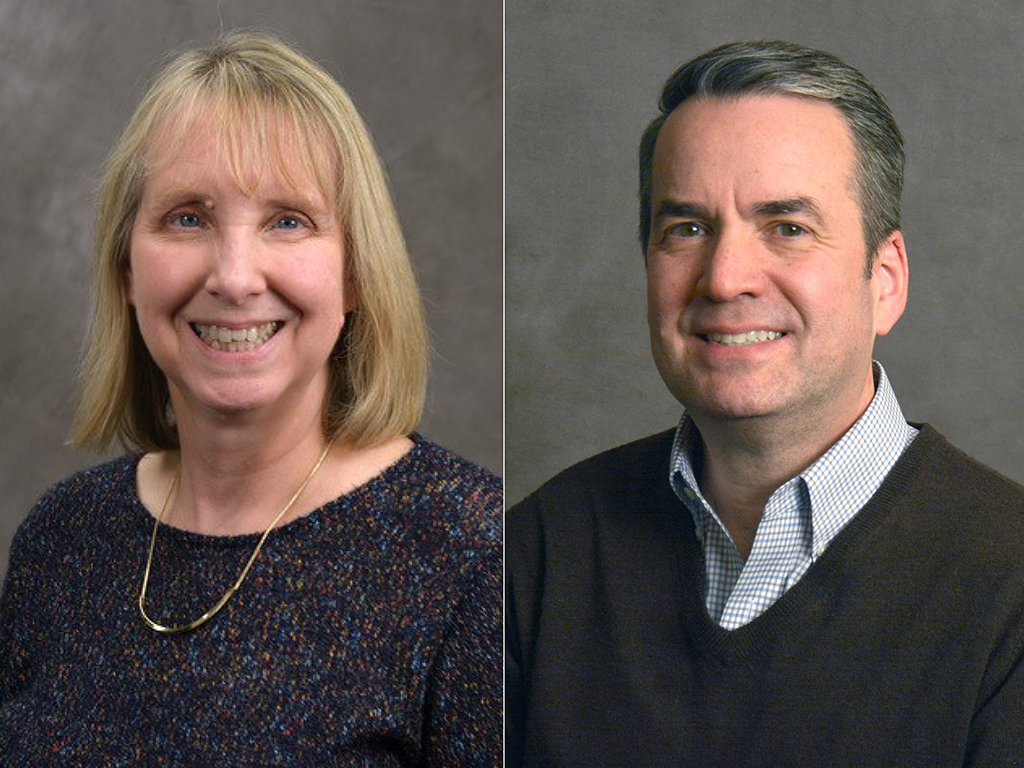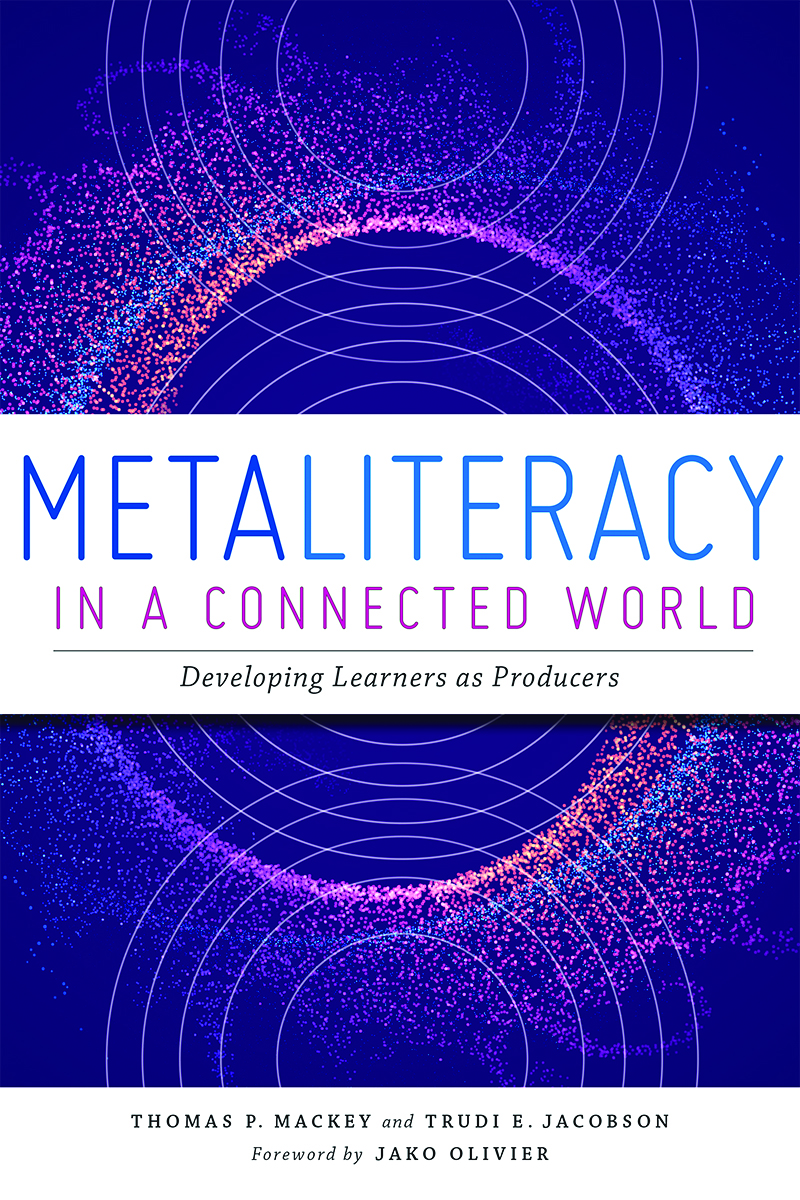"Making mistakes is such an important part of the learning process": an interview with Thomas P. Mackey and Trudi E. Jacobson about metaliteracy in a connected world
We live in a connected world, one that requires learners to be flexible, adaptable, and self-directed. And, as Thomas P. Mackey and Trudi E. Jacobson put it, "Today’s learners and contributors to the connected world need to understand their ethical responsibilities for consuming information in these spaces." Viewing learners as producers is an important part of a framework for nurturing reflective development and growth. In their newest book, Metaliteracy in a Connected World: Developing Learners as Producers, they delve into the active role today’s learners play as individual and collaborative metaliterate producers of information in various forms, including writing, digital stories, digital artifacts, and multimedia productions. We recently had the chance to talk with them about how the concept of metaliteracy has evolved, why it's important that learners are also skilled producers, and how a "growth mindset" relates to lifelong learning.
Congrats on the new book! When you were first developing the concept of metaliteracy, did you have any inkling that you’d still be exploring it as a team four books later?
When we first talked about the concept of metaliteracy we knew that we were on to something original that built on our previous work together, but we did not envision four books. In many ways, the development of this concept is a continuum of our collaboration that started in the classroom and evolved into a number of articles about information literacy and several books for ALA Neal-Schuman that explore faculty/librarian collaboration. In 2010 the field of Library and Information Science (LIS) was engaged in conversations about new approaches to information literacy and of course the information environment was experiencing revolutionary changes that needed to be addressed in a new model. The timing was ideal for the introduction of a comprehensive and unifying metaliteracy to rethink and reframe the prevailing conception of information literacy at the time. We have been able to expand our collaboration through several SUNY grant projects that allowed us to establish the Metaliteracy Learning Collaborative and we worked with a number of exceptional authors in our two edited volumes, Metaliteracy in  Practice and Metaliterate Learning for the Post-Truth World. All of this work advanced the concept in new and exciting ways.
Practice and Metaliterate Learning for the Post-Truth World. All of this work advanced the concept in new and exciting ways.
Metaliteracy opened up research and teaching possibilities that have developed over time and offer so much potential for further investigation. As such, we did have a sense from the start that this work would continue to evolve over time.
Perhaps the most surprising part of this process has been the far-reaching impact and interest in these ideas. For instance, we appreciate that key aspects of metaliteracy influenced the ACRL Framework for Information Literacy for Higher Education. In addition, we value the international interest in metaliteracy. We have been incredibly honored to be invited to keynote about metaliteracy online at Hildesheim University in Germany and at the University of Puerto Rico Virtual Conference and in person at La Universidad de Guadalajara, Mexico, and North-West University (NWU) South Africa, where we now have honorary appointments as Extraordinary Professors.
So yes we did have a sense that we would explore metaliteracy over time, but of course there have been so many exciting developments and surprises along the way!
Would you give us a brief description of metaliteracy and why you believe it’s more timely than ever?
Metaliteracy was originally conceived in reaction to the prevailing primarily skills-based and consumer-focused conception of information literacy at the time (2010). Since that time, however, it has developed as a model of social engagement with information featuring the learner at the core. As individuals develop a metaliteracy mindset they are prepared to engage effectively with a wide range of evolving information situations and settings.
To delve into metaliteracy a bit more, it has four core components: learning domains, learner roles, learner characteristics, and a set of goals and learning objectives. The four domains include two that are emphasized in teaching and learning (cognitive and behavioral), and two that are critical yet underrepresented: affective and metacognitive. The roles, including communicator, participant, teacher, producer (see next response), help learners to recognize their responsibilities in a social world. The learner characteristics are what metaliteracy is helping individuals build towards. Several examples are civic-minded, collaborative, participatory, and informed. The learning goals and objectives underpin the entire metaliteracy model. That explanation might not have been quite as brief as what you had in mind but it describes the model as it is explored in the new book!
As for the second part of your question, being a reflective, informed, and responsible consumer and producer of information is of critical importance today, when so many people show an absolute disregard for the truth. We've also seen the value of expertise dramatically diminished at a time when we need experts more than ever. All of metaliteracy’s core components work together to help individuals recognize their responsibilities to others and to the truth, as best as it can be determined in today’s divided information environment.
Why is it important for literacy that learners also become effective and skilled producers?
As we explore in the new book, the idea of the “learner as producer” has been around for some time. The producer role has been central to the metaliteracy idea from the start and was informed by our own teaching and research interests. The idea of being an effective and skilled producer of information is essential for today’s connected world that is both a creative space for collaboration and an online environment that unfortunately perpetuates misinformation and disinformation. Today’s learners and contributors to the connected world need to understand their ethical responsibilities for consuming information in these spaces while being open to producing new knowledge in a wide range of settings from classrooms and makerspaces to digital environments and virtual worlds. The idea of the metaliterate learner as producer advances both the individual construction of ideas and creative works, as well as the collaborative production of information in multiple modalities. The metaliteracy model offers interrelated components with a focus on the learner to support this kind of reflective development and growth.
 We are so excited about the new book because it grounds the concept of metaliterate learner as producer in a number of established learning theories while offering the practical applications of metaliteracy in specific case studies. Readers will recognize the theoretical underpinning of developing metaliterate producers and reflect on ways to adapt this approach to their own disciplines and pedagogical settings. We hope that the book sparks fresh ideas about preparing individual and collaborative knowledge producers through innovative learning activities and diverse modalities.
We are so excited about the new book because it grounds the concept of metaliterate learner as producer in a number of established learning theories while offering the practical applications of metaliteracy in specific case studies. Readers will recognize the theoretical underpinning of developing metaliterate producers and reflect on ways to adapt this approach to their own disciplines and pedagogical settings. We hope that the book sparks fresh ideas about preparing individual and collaborative knowledge producers through innovative learning activities and diverse modalities.
What is a “growth mindset” and how does it relate to lifelong learning?
The term growth mindset originated with Carol Dweck, an American psychologist who has written extensively on the topic, and gave a TED Talk, The Power of Believing You Can Improve in 2014. A growth mindset focuses on the effort you put into something. Rather than thinking that you aren’t smart enough or talented enough to do something (a fixed mindset), you realize that the effort you put into an endeavor is what matters. A quote from Dweck brings this mindset alive:
In a growth mindset, challenges are exciting rather than threatening. So rather than thinking, oh, I am going to reveal my weaknesses, you say wow, here is a chance to grow. (The Right Mindset for Success podcast interview, 2012)
This mindset meshes extremely well with metaliteracy’s fourth goal: “Develop learning strategies to meet lifelong personal and professional goals.” If you have a fixed mindset, you are much less likely to delve into new areas that require time and energy to succeed. Your lifelong learning would not be able to develop in creative and inventive ways. But with a growth mindset, the world’s your oyster! You just need to make a commitment and follow through on it when you are serious about learning or accomplishing something new. And you have to realize that there will be stumbles along the way–it is inevitable. Making mistakes is such an important part of the learning process, and the value of these experiences can be drawn out through the metacognitive dimension of metaliteracy. The idea of a growth mindset aligns nicely with the development of a metaliteracy mindset that prepares individuals for constantly changing information environments. We encourage readers to explore our blog for all of our latest updates and to engage further about these ideas.
Learn more at the ALA Store.
